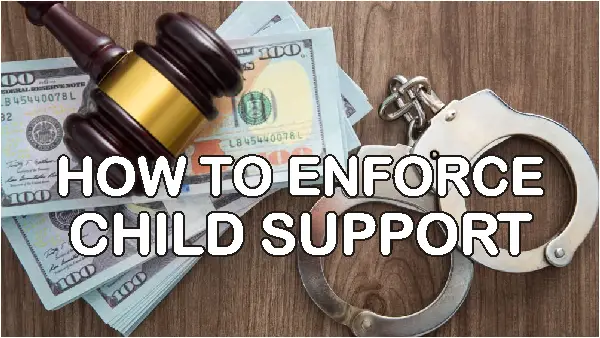
Custodial parents are always looking for information on how to enforce child support due to increased cases of delinquency in recent times. Parents who are divorced have a continuous legal responsibility to support their children in all 50 states and the District of Columbia. Unfortunately, when parents refuse to pay court-ordered child support, far too many children are growing up without the financial assistance they require.
Deadbeat parents are finding it more difficult than ever to avoid paying child support. To establish and execute child support obligations, strict rules have been enacted.
This article describes your legal options if a parent who is required to pay child support under the provisions of a court or government agency order fails to do so.
What is Child Support Enforcement?
The Child Support Enforcement (CSE) program assists in locating missing parents, establishing paternity, and enforcing child support responsibilities. CSE services are provided automatically to those who receive help through the Temporary Assistance for Needy Families (TANF), Foster Care, and Medicaid programs.
Parents who are not enrolled in assistance programs are eligible to apply for child support services, and any funds collected go straight to them. A parent with custody of a kid whose other parent lives outside the house is eligible for services.
Tribes having federal recognition can obtain funding to run a child support enforcement program that follows tribal laws and customs. Tribes receive $500,000 in funding for two years after an application is approved to put a program in place.
Who is Eligible for Child Support Enforcement?

Steps to Collect Child Support in {State}
To be eligible for this benefit program, you must meet the following requirements:
- be a parent or primary caregiver in need of paternity assistance,
- whether you’re establishing a child support order or collecting child support,
- be a federally recognized tribe with 100 children under the age of majority who are under the jurisdiction of the tribe.
How to Enforce Child Support
Perhaps the father of your child is not paying child support and you are wondering what you can do. Or the parent is just a deadbeat and deliberately avoiding their child support obligations? It could also be that the delinquent parent lost a job and so can not meet up the court-ordered support obligation. Whatever be the case, there are steps to enforce child support.
When the parent is not paying, the very first step is to report him/her to the court. Here are the steps:
1. Establishing Child Support
Initially, you and your child’s opposite parent can negotiate a reasonable amount of assistance (generally determined by your state’s requirements). Your agreement must be approved by a judge before it can be turned into an official court order.
If you are wondering how to report someone not paying child support, here is the complete information. You’ll have to petition a court or a local Office of Child Support Enforcement (OCSE) to decide the amount if you and your child’s other parent can’t agree. To file a petition for a child support order, you can engage an expert attorney in your area.
Don’t give up if you can’t afford a child support lawyer. The “Department of Child Support Services” or OCSE in your state or locality can assist parents in establishing, enforcing, collecting, and modifying child support orders.
These government entities do not represent any parent, but rather act on behalf of the state to ensure that children receive the necessary financial assistance. Local offices can also establish paternity (if necessary), seek medical support orders, track down deadbeat parents, and uncover assets that can be used to pay child support.
2. The Court Establishes and Issues a Support Order

The Court Establishes and Issues a Support Order
The court on receiving the petition will fix a date for a hearing when both parents will be invited. At the end of the hearing, the judge will determine, based on the evidence, if the non-custodial parent is not paying. If this is so, the court will issue an enforcement order.
3. Punishment for Not Paying Child Support
A child support order must always be obeyed once it has been established to avoid contempt of court. If you are wondering what happens if child support is not paid, note that any or all of the following child support enforcement tools may be used as punishment for not paying child support against a delinquent parent:
Wage Deductions – An income withholding order or wage assignment can be requested by the custodial parent, his or her attorney, or OCSS. Child support is deducted directly from the wages of the non-custodial (paying) parent through wage garnishment.
Suspensions and Revocations of Licenses – A delinquent parent’s driver’s and/or professional licenses may be revoked.
Interceptions of Federal Income Tax Refunds – The state has the authority to take a big tax refund to satisfy late or missed child support payments.
Passport Restrictions – If a parent refuses to pay child support, his or her passport may be revoked (and therefore prevented from leaving the country).
Lien on Property – You can have a lien placed on your assets, like property, automobile, etc. This way, the child support obligation is deducted when you sell any of these properties.
Withholding of lottery winnings – You can also have your obligation deducted from any lottery winnings.
Contempt of Court – is a legal order that can result in a fine or jail time for a parent who fails to pay child support as directed by the court. The custodial parent (or his or her attorney) must, however, go to court to get a judge’s order.
Can You Go to Jail for Not Paying Child Support?

There are consequences for not paying child support
YES! If you don’t pay your court-ordered child support, you could face a jail term of up to 12 months. The good news is that you’ll have multiple opportunities to correct the problem and make up the payments you’ve missed.
If you fail to pay your child support responsibilities, the other parent can request a court hearing and have you held in contempt of court as part of enforcing child support. You must first be served with a letter directing you to appear at the hearing, and then you must show up and explain why you’ve never paid your child support.
If you fail to appear, the court may issue an arrest warrant for you. Even if you show up, depending on how plausible your narrative is about why you haven’t paid, the judge may still imprison you for breaking the support order.
How Many Payments can be Missed Before Jail?
This is mainly determined by state laws. Some state courts will throw you into jail if you fail to pay child support for any more than 26 weeks out of 104, or if you are more than $5,000 in “arrearages” (past due child support payments). Nonpayment of child support on a regular basis is considered a criminal.
In some states, if the family gets public benefits, it will only take 5 days for a non-custodial parent to be deemed to have fallen behind on a payment, which results in a civil contempt hearing, which might result in a year in jail.
How to Avoid Jail for Unpaid Child Support
To avoid going to jail, attend the contempt of court hearing ready to establish that you have not purposefully broken the court’s child support order. It’s possible that you’ll have to persuade the judge that you’re not as irresponsible as you appear. Evidence preparation is a must.
The first step – to enforce child support, the first step is to demonstrate why you did not pay. If you’ve been unemployed for a while, obtain a sworn declaration from your most recent employer explaining why you were fired. If you went job hunting but were unsuccessful, keep track of when you interviewed or filled out an application, as well as who you communicated with. Remember:
The second step – You must then indicate why you did not request a revision hearing when it became clear that you would be unable to satisfy your support obligations. Get sworn affidavits from all medical experts who treated you if you’ve been in bed or otherwise incapacitated, unwell, or injured, for instance. Obtain statements from family or friends who were concerned about you. Be sure not to lie.
Job Loss and Inability to Pay Child Support
Regardless if you are unemployed or lost your job, you must comply with the court’s decision and pay child support. You will still be expected to make those payments if you skip any of your due obligations due to an inability to pay.
Interest is charged on unpaid child support. Failure to pay child support as directed by the court may result in the payment of the other parent’s legal fees, since legal issues of contempt may be brought against you.
Conclusion
You have to understand that failure to pay a court-ordered child support is a violation and has consequences. Also not being employed or lack of money is not an excuse.
There are government agencies you can petition to help you enforce unpaid child support Also if you feel there is a need to review the order due to your changed circumstances, you must approach the court and follow the process.





